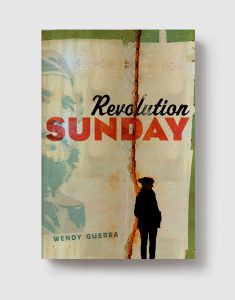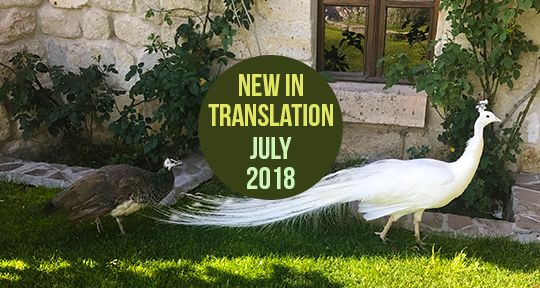For this week’s Translation Tuesday, Anastasia Afanas’eva constructs a world of shapes, shadows, and sensations that thematize dread and longing. The poem raises up images from the page in a maelstrom—a deluge of realizations that impress themselves on the reader like a flood. But the images’ actions are unreal; they are strung together in uncanny ways. In this poem, language acts absurdly, mirroring the unmistakable confusion of loss and of reckoning. The Hedgehog and its shadow are central, and show, in verse, how the most innocuous of things can become sutured with the weight of the universe.
Posts filed under 'loss'
Translation Tuesday: “Hedgehog” by Anastasia Afanas’eva

About the dead, we cannot speak / for they are completed.
Translation Tuesday: Two Poems by Allan Popa

How does one pass on to others / that which is clenched
Allan Popa’s poems are sublime examples of quiet that is every bit as piercing as a shout. Through visions of a body struggling to recognize the world, we are reminded through these subtle, yet vivid lines of what is kept, what is gone, and what is passed on. Wounds, light, reflection—all these things we see with our hands.
My Hands
Once again, I traced the path of a boat that healed the water. I whispered a courtesy and was permitted to pass the same old route. You haven’t gone far, said the stone that first wounded my knee. Yet I had believed it and let the hurrying damselflies through the window. On the roof, the leaves of the coconut are still sweeping their own shadow. The old neighbors are still trying to recognize themselves in the foggy mirror while my own face does not even recognize itself. Ay, if only my hands could be used for cover! How many times have I been let down? How many times have I tried cupping the water with my palms without my sense leaking out? I have nothing to reach you save my hands.
Thirteen Keys to a Doorless House in Toledo: On Tela de sevoya by Myriam Moscona
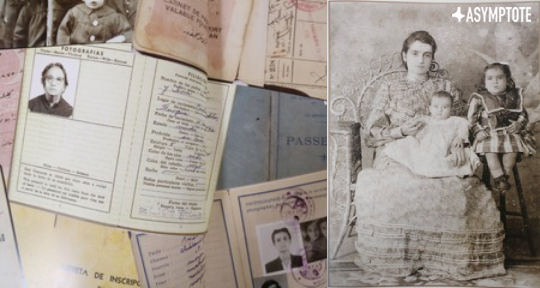
The Ladino language has etched on her tongue the addresses of countless houses in the Jewish Quarters of Toledo and Burgos.
Myriam Moscona’s Tela de sevoya (Onioncloth) was published in English in 2017, translated from the Ladino by Antena (Jen Hofer with John Pluecker). In today’s essay, Asymptote’s Sergio Sarano, himself a Ladino speaker, uses Moscona’s book as a starting point to explore the language and its history, shaped by the complex migrations of the Jewish diaspora. Sergio also discusses Ladino’s current status as an endangered language and highlights the important role that Moscona, as one of just a few writers who continue to publish in Ladino, has to play in keeping the language alive.
“I come upon a city
I remember
that there lived
my two mothers
and I wet my feet
in the rivers
that from these and other waters
arrive to this place”—Myriam Moscona
Translation Tuesday: Funeral Home by Ratih Kumala (UWRF Feature)
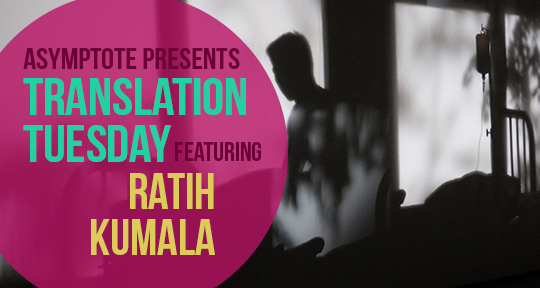
I don’t know where she got the news, but suddenly here she is, standing outside the hospital room.
Welcome to the sixth installment of A World with a Thousand Doors—a multi-part showcase of hitherto untranslated contemporary Indonesian writing. Curated by Norman Erikson Pasaribu and Tiffany Tsao, this series is a joint initiative between Asymptote and the Ubud Writers & Readers Festival. This week, Ratih Kumala, author of Cigarette Girl, spins a story in two voices—one belonging to a grieving widow and the other to her late husband’s grieving mistress. New to this series? Then do read installments one, two, three, four, and five. Stay tuned for more.
The first thought that entered my head when my husband gave up what remained of his ghost was how that woman might actually have felt more grief than me, his wife. At that moment, the clock hands shifted. It was three in the morning. My daughter sobbed, crying out for her Papa, her heartrending shrieks echoing down the hospital corridor. I wept quietly, while my son went very mute and cold.
I don’t know where she got the news, but suddenly here she is, standing outside the hospital room. Her face is darkened with grief. She attempts to enter, to approach my husband’s body, but I don’t let her in.
“Please. Have some respect for our family as we mourn,” I hiss. She stops short and looks at me for a while. Then she turns and walks away, probably crying as she goes.
Blog Editors’ Highlights: Fall 2018

To give you a taste of the Fall 2018 issue, the blog editors share their favorite pieces from Russian, Catalan, and Vietnamese.
Today, we share our favorite pieces from the Fall 2018 issue, released just four days ago, highlighting the diversity of cultures, languages, and literary styles represented. Chloe Lim, writing from Singapore, is joined today by two new blog editors as of last week: Jonathan Egid and Nina Perrotta, writing from the UK and Brazil respectively. Happy reading!
From the visceral, violent power of José Revueltas’ The Hole to the lyricism of Osama Alomar’s “Nuclear Bomb” and the schizoid voices of George Prevedourakis’ Kleftiko, our Fall 2018 edition plays host to a typically broad variety of styles, forms, and languages. A piece that particularly caught my eye was “Epilogue,” a quiet, sombre short story by Irina Odoevtsova about two Russian émigrées in Nice, their separation and their separate fates.
The story follows the unhappy existence of Tatiana and Sergei, initially as poor migrants surrounded by the Anglo-American holidaying elite of the Riviera, through Sergei’s uncertain departure and Tatiana’s newfound wealth to a tragic conclusion, with much of the story being told through short, terse conversations between Tatiana and Sergei, Tatiana and her new lover and (more frequently) Tatiana and herself. The restrained, even sparse dialogue and plain prose nevertheless creates touching, vivid and tragic characters in strikingly limited space, conveying to us the tragic story of a woman struggling to understand her dreams and desires, and the tragic consequences that come from her acting upon those confused and conflicting desires.
Translation Tuesday: Three Poems by Gratiagusti Chananya Rompas (UWRF Feature)
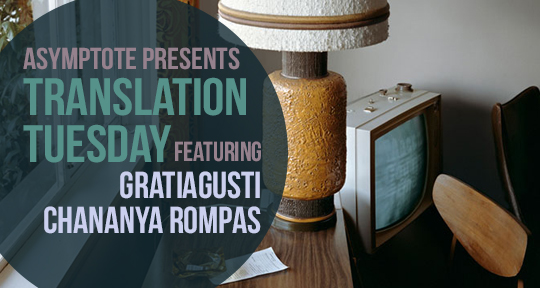
Breaking News. / outside, the universe is dark. it is Real.
Welcome to the third installment of A World with a Thousand Doors—our Translation Tuesday series showcasing Indonesian literature, brought to you in partnership with the Ubud Writers and Readers Festival. This week’s feature: poetry by festival guest Gratiagusti Chananya Rompas, translated by past Asymptote contributor Mikael Johani. If you are joining these amazing writers and translators, don’t forget that you can save 20% on the 4-Day Pass by entering the code MPAS at the online checkout!
soap bubbles float in the air explode
on the tip of my toes
a scavenger collects rubbish from tiny barrels crams them into oversized
plastic hessian bags
washes his hands with water from a half-empty mineral
water bottle
mums run around, carry hello kitty backpacks, ben ten water bottles,
an extra change of clothes, a tiny towel
kids scream and shriek they want to buy baby turtles kept in colourful transparent
plastic boxes
a tourist photographer presses the shutter on his camera
ten thousand rupiahs per photo
and always you forget to smile
Translation Tuesday: “Cellophane” by Maria A. Ioannou
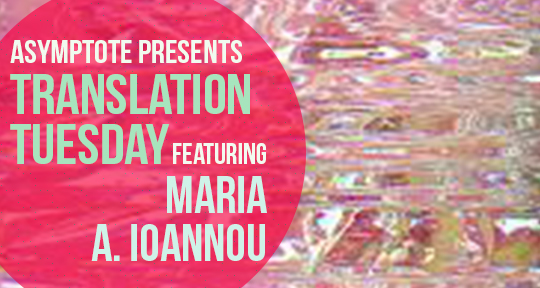
Dad and I chat away at night; he wrapped in cellophane.
From Malta to Japan, we continue our island-hopping this week with a new translation from Cyprus. This week’s Translation Tuesday of “Cellophane” by Maria A. Ioannou tells a heartbreaking story of a child dealing with the loss of a father. The young voice filled with both hope and pain comes through beautifully in Despina Pirketti’s translation.
Dad and I chat away at night; he wrapped in cellophane.
When mum goes to bed I open the closet in the guest room. I show him my new toys, the big remote control tractor and my teddy bear—and he fogs up the cellophane with his breath, grooving hearts for me with his nose. I try to come closer and kiss him in the Eskimo way, but I can’t reach him, and before too long the sketches on the cellophane will fade, there’s no room for more. He stands there still, like Tutankhamun’s mummy enclosed in wood. This reminds me of the boxes that keep the dead locked in. “The living can’t stand the dead,” grandma used to say. The living are afraid of the dead, that’s why they shut them in a box, to keep them from waking up and seeking revenge like vampires do! My words.
For many, summertime offers that rare window of endless, hot days that seem to rule out any sort of physical activity but encourage hours of reading. While these might not be easy beach reads in the traditional sense of online listicles, we are here with a few recommendations of our favorite translations coming out this month! These particular books, from China, France, and Argentina, each explore questions of masculinity, death, and creativity in unexpected ways while also challenging conventional narrative structures. As always, check out the Asymptote Book Club for a specially curated new title each month.
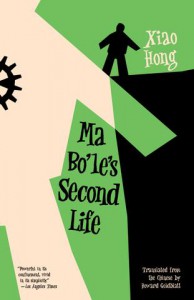
Ma Bo’le’s Second Life by Xiao Hong, translated from the Chinese by Howard Goldblatt, Open Letter, 2018
Review by Sam Carter, Assistant Managing Editor
The “second life” in the title of this scintillatingly satirical novel alludes to how we live on in fictions as well as to how fictions sometimes take on a life of their own. Partially published in 1941 simply as Ma Bo’le, Xiao Hong’s late work was in the process of being expanded, but the throat infection and botched operation that cut her life short at age thirty left further planned additions unfinished. Fortunately for English-language readers, though, it’s now been capably, inventively, and gracefully completed by Howard Goldblatt in an exemplary instance of a translation demanding—as do all renderings into another language—that we attend to its twinned dimensions of creativity and craft. Previously the translator of two Xiao Hong novels as well as a quasi-autobiographical work, Goldblatt was undoubtedly the perfect person to carry out what he fittingly calls “our collaboration,” which is the result of “four decades in the wonderful company—figuratively, intellectually, literarily, and emotionally—of Xiao Hong.”
Translation Tuesday: Two poems by Moon Taejun
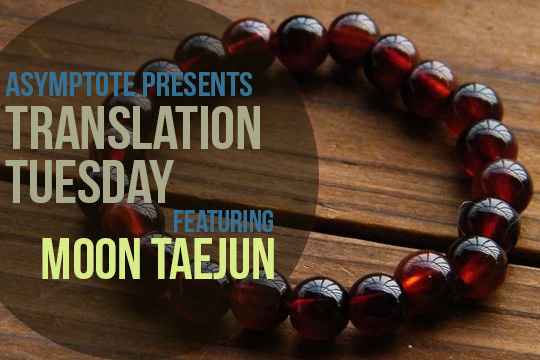
The things that she called upon spiralled in orderly circles and soared into the glistening winter sky.
As the editor of a world literature journal who’s read submissions across all genres for more than six years now, I’m always on the look-out for a certain cosmic echo when one piece of writing rhymes with another from a different continent, as if confirming our shared humanity. Last week’s poem by Portuguese poet Ana Luísa Amaral, addressed from mother to daughter, is perfectly answered by these elegiac verses by Korean counterpart Moon Taejun mourning a departed mother, and capturing a magnificent stillness.
—Lee Yew Leong, Editor-in-Chief
My Mother’s Prayer Beads
One day my mother sat blankly as she fingered her cold prayer beads.
My mother lowered her head as though mending some frayed clothes. She mustered the flowers, thunders, grasshoppers, and snowstorms; she also called upon my dead granny, me who was ailing, and my maternal uncle who lived afar. Silently, she bound up small scraps of cloth. Then she called upon the terrifying darkness, the valley fog, the roaring fire, and the stars on high. A faint, lengthy song arose from my mother’s bosom like it did when she used to sing me to sleep. She hummed the simplest song that all – the stag beetle, the puny bird, the eight-year-old child, the ninety-year-old granny, the parched verdure, the flock of sheep and its meadow, and creatures with menacing teeth – would know. The song my mother sang was fettered by her cold prayer beads while the things that she called upon spiralled in orderly circles and soared into the glistening winter sky.
A Faraway Place
Today the air teems with words of goodbye.
A handful, a handful at a time, I breathe the words of goodbye.
A faraway place comes forth.
As it pushes me little by little, a faraway place comes forth.
I would bring with me the first newly sprouted leaf, her lips, her crimson
cheeks, and her beaming eyes that make me shy.
The air raises my heart, like a fragile piece of ice, and passes me by.
The barren tree sheds and sheds its leaves and the rock governs the dim
light of the stone’s shadow.
The bench sits at the same spot all day long with a frame on which nobody
is seated even now.
Hands quivered, eyes damped, and at a loss for words.
When everybody speaks of farewells,
a faraway place comes forth,
somewhere we can hardly fathom.
Recovery in Ruins: A Review of Bella Mia
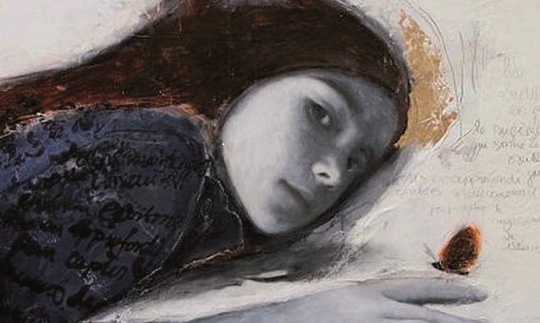
Caterina has always identified herself in relation to her sister; she was the ‘other’ twin.
In the wake of the more recent earthquakes in central Italy it seems painfully appropriate that Calisi Press should choose to release the English translation of Donatella Di Pietrantonio’s award winning Bella Mia, set in the aftermath of the devastating 6.3 magnitude earthquake in L’Aqualia in 2009, the deadliest Italy had seen since 1980.
In the early hours of 6 April, 2009, amidst the chaos of the tremors, one woman dies. She leaves her only son behind, left in the care of her surviving twin sister, Caterina, and their elderly mother. The broken family becomes the center for Pietrantonio’s moving tale of recovery. Set in the ruins of a family and the wreckage of the city, the story details the delicate stages of grief as each character moves to re-build their lives after the disaster.
Caterina’s sister Olivia was a constant presence in her life, and one cannot help but think of the powerful female relationships depicted in Ferrante’s novels when reading Caterina’s memories of the two as children, surviving the complex and riddled world of the schoolyard and vying for attention from their peers. In her death, Olivia becomes omnipresent in the lives of those she has left behind: her son blindly chases cars driven by women who look like her; her mother builds her day around visiting her grave, her sister still wears her clothes for good luck. Caterina’s survival guilt is evident—she is ‘alive by mistake’ as far as her nephew is concerned—and the constant expectation that she ‘should be his spare mother’ rather than his grieving aunt torments her. ‘We could have swapped deaths, as we’d always swapped clothes, books, occasions,’ Caterina obsesses. She dwells on the inevitable, unanswerable question: why her? Why was fate kind to her and not her twin? For two people so tightly bound for so many years, why at this point in time were they so violently torn apart?


